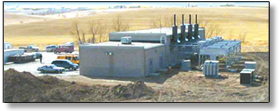Nebraska Ethanol Plant Site of Announcement...
 U.S. Environmental Protection Agency Proposes Strategy to Reduce Foreign Oil Dependency
U.S. Environmental Protection Agency Proposes Strategy to Reduce Foreign Oil Dependency
Projecting annual cuts up to 3.9 billion gallons in petroleum use and 14 million tons in greenhouse gas emissions, the U.S. Environmental Protection Agency in September 2006 proposed a Renewable Fuels Standard program designed to reduce the nation's dependence on foreign oil by doubling the use of renewable fuels such as ethanol and biodiesel.
Newer Isn’t Always Better...
How Do the 2006 Residential and International Energy Codes Stack Up?
Every three years, organizations responsible for updating construction codes publish new ones. That’s the case with the International Energy Conservation Code and the International Residential Code. Both were updated in 2006. When the Nebraska Legislature updated the state’s energy code in 2004, it established the 2003 International Energy Conservation Code as the Nebraska Energy Code.
Groundbreaking for First Biodiesel Plant in Nebraska
 In Beatrice on August 26, 2006, company officers joined local and state officials to break ground on a $52.5 million biodiesel plant capable of producing 50 million gallons and 5 million gallons of glycerin a year. The plant will employ 21 people when it is fully operational.
In Beatrice on August 26, 2006, company officers joined local and state officials to break ground on a $52.5 million biodiesel plant capable of producing 50 million gallons and 5 million gallons of glycerin a year. The plant will employ 21 people when it is fully operational.
Federal Team Makes a Stop...
Energy Saving Assessment Conducted at Cargill in Blair
The U.S. Department of Energy announced that a three-day industrial energy saving assessment was completed in September 2006 at the Cargill facility in Blair, Nebraska. This is part of a comprehensive national energy efficiency effort using no-cost assessments.
More Help from EnergyStar...
 Home Remodeling and Energy Savings
Home Remodeling and Energy Savings
Many homeowners don't realize that when they improve or remodel their home, they can save money on energy bills, improve comfort and help protect the environment. Each year, as homeowners spend more than a $100 billion on home improvement and home repair projects, many miss the opportunity to improve the energy efficiency of their homes and reap the rewards. The U.S. Environmental Protection Agency wants to change this and has developed an interactive ENERGYSTAR website...
Doubling the Capacity...
 Omaha Public Power District Expands Renewable Energy Plant
Omaha Public Power District Expands Renewable Energy Plant
One of Nebraska’s largest sources of renewable energy grew in July 2006. In late July, Omaha Public Power District dedicated an expansion of its Elk City Generating Station, next to the Douglas County landfill. The Elk City generating station is powered by gas generated from the landfill. Since the station opened in April 2002 through May 2006, it has produced nearly 114 million kilowatt-hours, producing enough electricity to power about 2,000 homes.
U.S. Department of Energy Awards $2.586 Million for Home Weatherization in Nebraska
 In July 2006, U.S. Department of Energy announced a grant of $2,586,397 in weatherization program funds to the Nebraska Energy Office to make energy efficiency improvements in homes of low-income families.The Low-Income Weatherization Assistance Program in Nebraska typically makes home improvements such as adding wall and attic insulation, checking the safety and energy efficiency of furnaces, stoves and water heaters, and, in some cases, replacing furnaces.
In July 2006, U.S. Department of Energy announced a grant of $2,586,397 in weatherization program funds to the Nebraska Energy Office to make energy efficiency improvements in homes of low-income families.The Low-Income Weatherization Assistance Program in Nebraska typically makes home improvements such as adding wall and attic insulation, checking the safety and energy efficiency of furnaces, stoves and water heaters, and, in some cases, replacing furnaces.
Getting the Most from Your Energy Dollar...
 Using Energy Wisely on the Farm and Ranch
Using Energy Wisely on the Farm and Ranch
Energy is one of the more expensive components of raising crops and livestock. In fact in 2005 in Nebraska, ag expenditures rose 10 percent above 2004 costs according to the U.S. Department of Agriculture due in part to rising costs for fuel and fertilizer – which is petroleum-based. An earlier USDA study found nearly half the cost of production was being spent for energy because of rising costs.
Questions and Answers...
5% Dollar and Energy Saving Loans
Q: In researching the purchase of a new furnace and air conditioner, I was disappointed that I would have had to purchase a furnace costing $1,000 more in order to qualify for the 5% financing...Q: We are seeking a loan to replace the windows in our house. We also want to replace our propane hot water heater and propane radiant heat system with a corn furnace that would heat the water and circulate it through the radiant system and water system. Would this qualify for the loan?...Q: We plan to install geothermal heat and air conditioning in a recently purchased house, replacing the gas furnace and the air conditioner. Are any rebates available for this upgrade?
News Bytes
-
An Update on America’s Energy Addiction
According to the U.S. Department of Energy in a July 2006 report, between January and May of 2006, the nation imported 10.6 percent of the crude oil and refined petroleum products from the Persian Gulf.
- Ag Producers: Bioenergy in Next Farm Bill
Agricultural producers want to see the next federal farm bill address renewable energy issues as well as traditional concerns such as disaster relief and other "safety-net" provisions according to a new national survey, "The 2007 Farm Bill: U.S. Producer Preferences for Agricultural, Food and Public Policy," released September 2006.
- Don’t Forget About Tax Credits for Energy Saving Purchases
As 2006 winds down, don’t overlook an array of tax credits for making energy efficient home improvements or purchasing gas stingy vehicles. There are a variety of resources that provide information on the various tax credits available.
- Forecasting Wind Speeds To Get Better
The Municipal Energy Agency of Nebraska, also known as MEAN, received a $26,000 grant and $4,000 scholarship from the American Public Power Association to develop a wind energy forecasting module.
- Lincoln Electric System Rates in Lowest 10 Percent
For 19 straight years, Lincoln Electric System’s rates have ranked in the lowest ten percent in a nationwide study of 106 cities completed in July 2006. According to the survey, Lincoln Electric System customers who used 1,000 kilowatthours of electricity pay about $61., 39 percent less than the survey average of $98.
- Nebraska Public Power District May Buy Electric Vehicles
The Columbus-based Nebraska Public Power District is considering buying several electric utility vehicles for use at power plants. The utility had the vehicles in Columbus in August 2006 to “test drive” the new electric technology being used. The utility expects to make a decision on the vehicles in the next few months.
- Omaha Public Power District Wins Top Service Award
For six years straight, Omaha Public Power District customers have recognized the utility’s efforts to provide quality and reliable service according to a survey by J.D. Power and Associates.

The Nebraska Energy Quarterly is funded, in part, by the U.S. Department of Energy through the State Energy Program. |
 Ask The Energy Wiz!
Ask The Energy Wiz!
Answers to Your Questions
In this issue, the Wiz answers questions about solar energy...
Send a Question
|
|



 • Home
• Home

 Ask The Energy Wiz!
Ask The Energy Wiz!

 In Beatrice on August 26, 2006, company officers joined local and state officials to break ground on a $52.5 million biodiesel plant capable of producing 50 million gallons and 5 million gallons of glycerin a year. The plant will employ 21 people when it is fully operational.
In Beatrice on August 26, 2006, company officers joined local and state officials to break ground on a $52.5 million biodiesel plant capable of producing 50 million gallons and 5 million gallons of glycerin a year. The plant will employ 21 people when it is fully operational.

 Omaha Public Power District Expands Renewable Energy Plant
Omaha Public Power District Expands Renewable Energy Plant In July 2006, U.S. Department of Energy announced a grant of $2,586,397 in weatherization program funds to the Nebraska Energy Office to make energy efficiency improvements in homes of low-income families.The Low-Income Weatherization Assistance Program in Nebraska typically makes home improvements such as adding wall and attic insulation, checking the safety and energy efficiency of furnaces, stoves and water heaters, and, in some cases, replacing furnaces.
In July 2006, U.S. Department of Energy announced a grant of $2,586,397 in weatherization program funds to the Nebraska Energy Office to make energy efficiency improvements in homes of low-income families.The Low-Income Weatherization Assistance Program in Nebraska typically makes home improvements such as adding wall and attic insulation, checking the safety and energy efficiency of furnaces, stoves and water heaters, and, in some cases, replacing furnaces. Using Energy Wisely on the Farm and Ranch
Using Energy Wisely on the Farm and Ranch